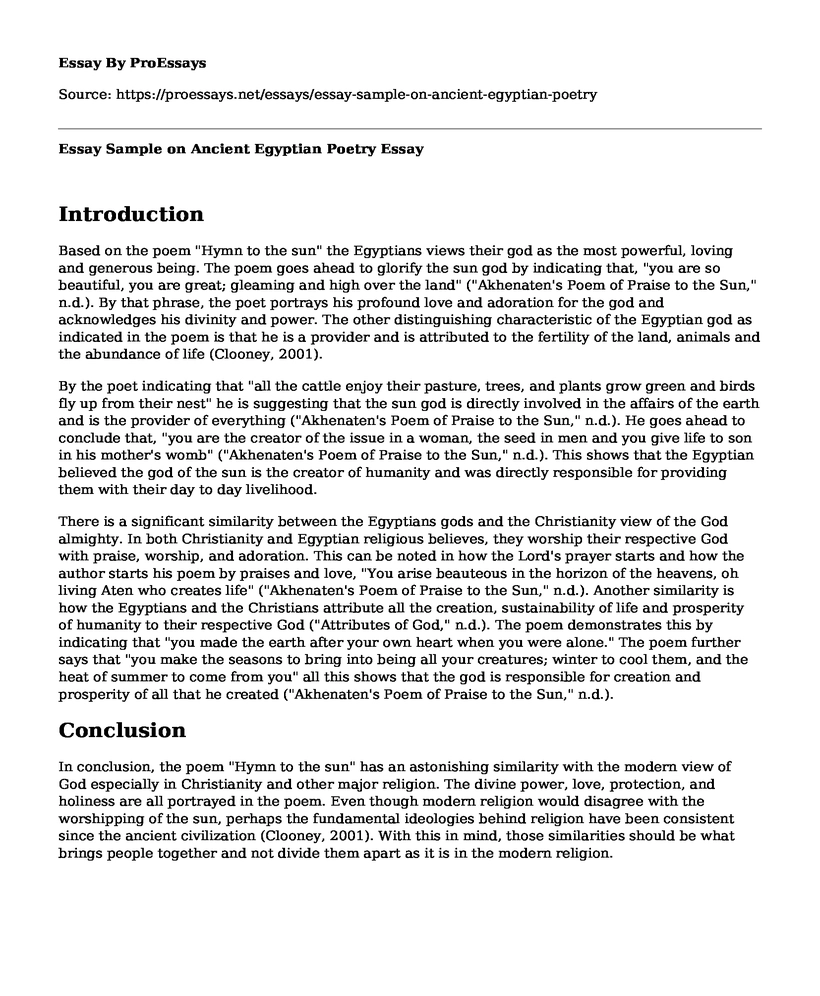Introduction
Based on the poem "Hymn to the sun" the Egyptians views their god as the most powerful, loving and generous being. The poem goes ahead to glorify the sun god by indicating that, "you are so beautiful, you are great; gleaming and high over the land" ("Akhenaten's Poem of Praise to the Sun," n.d.). By that phrase, the poet portrays his profound love and adoration for the god and acknowledges his divinity and power. The other distinguishing characteristic of the Egyptian god as indicated in the poem is that he is a provider and is attributed to the fertility of the land, animals and the abundance of life (Clooney, 2001).
By the poet indicating that "all the cattle enjoy their pasture, trees, and plants grow green and birds fly up from their nest" he is suggesting that the sun god is directly involved in the affairs of the earth and is the provider of everything ("Akhenaten's Poem of Praise to the Sun," n.d.). He goes ahead to conclude that, "you are the creator of the issue in a woman, the seed in men and you give life to son in his mother's womb" ("Akhenaten's Poem of Praise to the Sun," n.d.). This shows that the Egyptian believed the god of the sun is the creator of humanity and was directly responsible for providing them with their day to day livelihood.
There is a significant similarity between the Egyptians gods and the Christianity view of the God almighty. In both Christianity and Egyptian religious believes, they worship their respective God with praise, worship, and adoration. This can be noted in how the Lord's prayer starts and how the author starts his poem by praises and love, "You arise beauteous in the horizon of the heavens, oh living Aten who creates life" ("Akhenaten's Poem of Praise to the Sun," n.d.). Another similarity is how the Egyptians and the Christians attribute all the creation, sustainability of life and prosperity of humanity to their respective God ("Attributes of God," n.d.). The poem demonstrates this by indicating that "you made the earth after your own heart when you were alone." The poem further says that "you make the seasons to bring into being all your creatures; winter to cool them, and the heat of summer to come from you" all this shows that the god is responsible for creation and prosperity of all that he created ("Akhenaten's Poem of Praise to the Sun," n.d.).
Conclusion
In conclusion, the poem "Hymn to the sun" has an astonishing similarity with the modern view of God especially in Christianity and other major religion. The divine power, love, protection, and holiness are all portrayed in the poem. Even though modern religion would disagree with the worshipping of the sun, perhaps the fundamental ideologies behind religion have been consistent since the ancient civilization (Clooney, 2001). With this in mind, those similarities should be what brings people together and not divide them apart as it is in the modern religion.
References
Akhenaten's Poem Of Praise To The Sun. (n.d.). Retrieved from http://www.palmyria.co.uk/superstition/akhenaten.htm
Attributes of God. (n.d.). Retrieved from https://www.allaboutgod.com/attributes-of-god.htm. Accessed 30 August 2018
Clooney, F. X. (2001). Making Sense of Divine Embodiment. Hindu God, Christian God, 94-128. doi:10.1093/0195138546.003.0004
Cite this page
Essay Sample on Ancient Egyptian Poetry. (2022, Jul 18). Retrieved from https://proessays.net/essays/essay-sample-on-ancient-egyptian-poetry
If you are the original author of this essay and no longer wish to have it published on the ProEssays website, please click below to request its removal:
- Willie and Billie in Death of the Salesman: The Problem of Trust and Psychological Breakdown
- Cause and Effect Essay on Cold War
- Essay Sample on Woman in Ancient Society
- Rip Van Winkle Character Analysis
- Essay Example on Spartan Hegemony: Unsuccessful & Athenian Alliance/League Difference
- Essay Example on Jennifer Doudna: Pioneering CRISPR-Cas9 Genome Engineering Expert
- Book Review Sample on 'The Miser': Greed, Love & Dubious Coincidences







